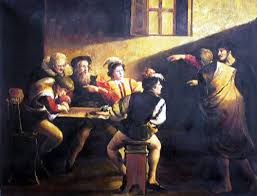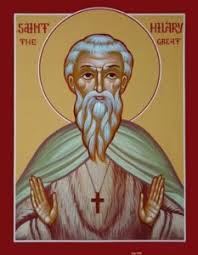HOMILY WEEK 01 06 – Year II
The Call of Levi – Gratuitous Grace:
Optional Memorial of St. Hilary
(1 Sm 9:1-19; Ps 21; Mk 2:13-17)
************************************************************
The Word Among Us offers this reflection for today’s liturgy:
“Why does he eat with tax collectors and sinners?”
Jesus and his disciples are eating in the courtyard of Levis’ house. But his opponents can’t understand why. How could he be sharing a table with tax collectors and other “undesirables”? Doesn’t he believe the teachings of the Torah that call Israelites to separate themselves from the unclean?
What do you think is on Jesus mind? Could it be possible he is wishing with all his heart his detractors could join them for dinner? It might be hard to imagine this situation, but that has always been Jesus’ vision, dream and desire. He wants everyone around his table! He wants us all to be united in love and brotherhood. In fact, his final prayer before his crucifixion was “that they may all be one, as you, Father, are in me and I in you” (John 17:21).
When we think of our brothers and sisters in other denominations, we probably aren’t like these Pharisees who opposed Jesus. We don’t shun them or put them down. But there are still walls between us and other churches. Some of those walls were built centuries ago through schisms and religious wars. Some were built by years of ignorance and false assumptions. And some walls arose simply because we find it uncomfortable to step outside our comfort zones. But there is no wall that Jesus can’t pull down.
 In the gospel today, we see Jesus in action, pulling down some of those walls. Jesus shocks everyone by reaching out to a sinner, a chief tax collector, here called Levi, and inviting him to join his band of disciples. This was a totally unmerited, gratuitous offer of grace, and Levi responded. In Caravaggio’s magnificent painting of this scene, Matthew responds to Jesus’ summons by pointing incredulously to himself and wearing a quizzical expression, as if to say, “Me? You want me?” The hand of Christ in Caravaggio’s picture is adapted from the hand of God the Father in Michelangelo’s depiction of the creation of man on the Sistine Chapel ceiling. Just as creation is ex nihilo, so conversion is a new creation.
In the gospel today, we see Jesus in action, pulling down some of those walls. Jesus shocks everyone by reaching out to a sinner, a chief tax collector, here called Levi, and inviting him to join his band of disciples. This was a totally unmerited, gratuitous offer of grace, and Levi responded. In Caravaggio’s magnificent painting of this scene, Matthew responds to Jesus’ summons by pointing incredulously to himself and wearing a quizzical expression, as if to say, “Me? You want me?” The hand of Christ in Caravaggio’s picture is adapted from the hand of God the Father in Michelangelo’s depiction of the creation of man on the Sistine Chapel ceiling. Just as creation is ex nihilo, so conversion is a new creation.
Matthew immediately got up and followed the Lord – of all things, to a banquet in his own house. Before Jesus calls Matthew to do anything, Jesus invites him to recline in easy fellowship around a festive table, celebrating his transformation. As Erasmo Levia-Merikakis comments, “The deepest meaning of Christian discipleship is not to work for Jesus, but to be with Jesus.”
An incident I witnessed in a community I once served illustrates the dynamics behind this “outside the comfort zone” style of ministry of Jesus (and perhaps Pope Francis). Adam, who was organizing a Corpus Christi procession to a grotto, needed one more volunteer to hold a pole of the processional canopy, and put it into the hands of Ray nearby, standing at the door at the back of the church. The reason he was at the back is because he was living in a common-law relationship and did not feel worthy to be up front. And so, Ray ended up walking right next to Jesus in the Blessed Sacrament all the way to the grotto.
That evening, I received a phone call from Ray to tell me he had talked things over with his partner, and could they start preparations for marriage? It seems that much transpired in Ray’s mind and spirit during that walk next to the Blessed Sacrament all the way to the grotto, moving him to take some action to rectify his situation. It struck me that if Adam had judged Ray as not worthy to carry that pole, this change of heart and phone call would not have taken place. Could it be the same thing that happened to Levi – that gratuitous, non-judgmental offer of grace by Jesus to him, unworthy as he was, changed his heart and transformed him into not only a follower, but an evangelist who would write one of the gospels. Can we in turn, begin to treat others as Jesus treats them, and has treated us?
 Today the church honours St. Hilary, who is best known for his defense of Christianity against the 4th-century Arian heresy, a position that questioned the nature of the Trinity. Chosen bishop of Poitiers about 350, Hilary offered a valiant defense of Christianity. His stay in the Eastern Church enriched his theological writings, and he continued his confrontation with Arianism until his death circa 368. He was proclaimed a Doctor of the Church in 1851. He is patron saint of lawyers.
Today the church honours St. Hilary, who is best known for his defense of Christianity against the 4th-century Arian heresy, a position that questioned the nature of the Trinity. Chosen bishop of Poitiers about 350, Hilary offered a valiant defense of Christianity. His stay in the Eastern Church enriched his theological writings, and he continued his confrontation with Arianism until his death circa 368. He was proclaimed a Doctor of the Church in 1851. He is patron saint of lawyers.
The Eucharist is another gratuitous offer of grace to us, which we acknowledge by the words, “Lord, I am not worthy…” before receiving communion. May our celebration fill us with appreciation of how loving and merciful our God is, and empower us to love others as Jesus has loved us.



